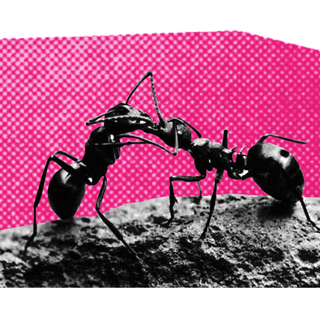
Baby Scent May Influence ‘Aggressiveness’ in Women, Men, Suggests Research
The findings can help explore the role scent might play in human social interactions, and the ecological advantage it serves.

Did you know babies can inspire aggressiveness in women while mellowing down men? According to a new study, a “superpowered scent [from babies] can manipulate [their] parents’ moods,” as one article states.
Published in Science Advances last week, the study found that an odorless chemical called hexadecanal (HEX) “affects human aggression” — blocking it in men and triggering it in women. HEX is believed to be “one of the most abundant substances emitted by human babies from their heads.” In general, HEX is known to be emitted from people’s skin, saliva, and feces.
“Like all mammals, humans sniff themselves and each other all the time… Now, perhaps we know the outcome of sniffing newborns and have a better understanding of the mechanisms involved, and of its possible evolutionary role,” Noam Sobel, a neuroscientist at the Weizmann Institute of Science, who co-authored the study, said in a statement.
To study the effect of HEX on people, the researchers had the participants play a series of computer games designed to evoke intense frustration; they were “purposefully annoying.” One of the games involved participants “blasting” their opponents with noise. The louder the noise they made, the higher their aggression level was deemed to be. After sniffing HEX, the blasts from women players were found to be louder, and those from men, quieter.
Related on The Swaddle:
Baby Teeth Can Help Identify Children at Risk of Mental Health Issues
“We were really surprised… Our hypothesis was that it was a social cue that reduced aggression, but we didn’t expect it to cause a different reaction in men and women,” Eva Mishor from the Weizmann Institute of Science in Israel, who led the study, told The Times of Israel. “However, once we started to observe and understand it, there was logic,” she added.
But what is this “logic”? Researchers believe a possible explanation for this varied reaction of HEX on the different sexes could be an evolutionary tactic. Maternal aggression may help defend babies better from potential threats while making men less likely to attack, or even kill them. “The effect seems to make sense in childrearing, because in the animal kingdom… Male aggression translates many times into aggression toward newborns; infanticide is a very real phenomenon in the animal kingdom,” Mishor explained. “Meanwhile, female aggression usually translates into defending offspring.”
And so, the influence of scent on human behavior may, in fact, increase the survival of infants, “who has limited communication.” The infant may get “the effect they need from both parents,” she notes.
That’s not all. The findings of the new study may prove to be an important milestone in pheromone research as well. Pheromones are chemical compounds that may influence mating or aggression in animals and insects. The role of pheromones in humans has, so far, not been confirmed.
Related on The Swaddle:
Alarming New Study Finds Baby Poop Is Loaded With Microplastics
But could this study be en route to do precisely that? While it is a possibility, scientists don’t seem too sure. “It’s fascinating research, but I’m not sure how much weight to put on it,” Tristram Wyatt, a pheromone researcher at Oxford University in the U.K., told the press. One of the reasons why Wyatt is steering away from drawing defibitive conclusions is because “claims on sex-based differences [in] brain structure and activity have been shown to be largely unreliable, with recent research suggesting that our brains are individual ‘mosaics’ of ‘female-typical and male-typical features,'” according to PopSci.
The researchers aren’t really pushing for the confirmation of pheromones in humans as a study-finding either. “We cannot say that this is a pheromone,” Sobel agreed. “But we can say that it’s a molecule expressed by the human body that influences human behavior… in a predicted manner.”
Moreover, the findings identified brain regions that became activated due to the chemical. These areas “form some kind of a social and emotional-decision making network,” Mishor said, adding the sexual variations could shed light on different brain mechanisms underlying aggressive behavior in men and women.
In the end, it may also inspire more research around the power of scent. “Human olfaction is one of the most primordial senses,” Mishor said. “It is wired differently in the brain than other senses, and it many times bypasses consciousness and impacts us without us being aware of the effect.”
Devrupa Rakshit is an Associate Editor at The Swaddle. She is a lawyer by education, a poet by accident, a painter by shaukh, and autistic by birth. You can find her on Instagram @devruparakshit.
Related


Astronomers Find 2 ‘Invisible’ Galaxies Behind Cosmic Dust
